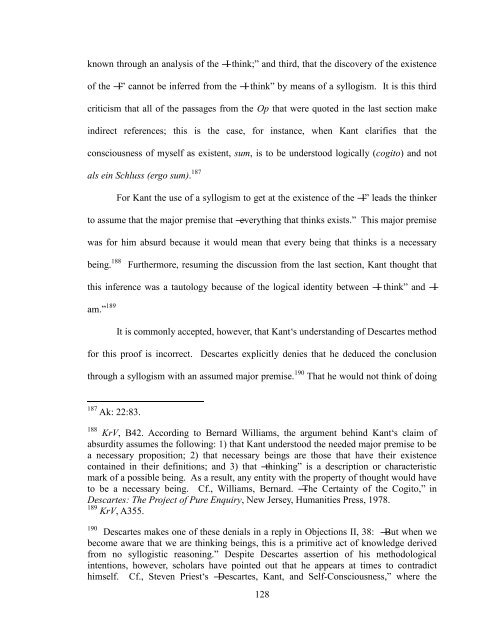The Doctrine of Self-positing and Receptivity in Kant's Late ...
The Doctrine of Self-positing and Receptivity in Kant's Late ...
The Doctrine of Self-positing and Receptivity in Kant's Late ...
Create successful ePaper yourself
Turn your PDF publications into a flip-book with our unique Google optimized e-Paper software.
known through an analysis <strong>of</strong> the ―I th<strong>in</strong>k;‖ <strong>and</strong> third, that the discovery <strong>of</strong> the existence<br />
<strong>of</strong> the ―I‖ cannot be <strong>in</strong>ferred from the ―I th<strong>in</strong>k‖ by means <strong>of</strong> a syllogism. It is this third<br />
criticism that all <strong>of</strong> the passages from the Op that were quoted <strong>in</strong> the last section make<br />
<strong>in</strong>direct references; this is the case, for <strong>in</strong>stance, when Kant clarifies that the<br />
consciousness <strong>of</strong> myself as existent, sum, is to be understood logically (cogito) <strong>and</strong> not<br />
als e<strong>in</strong> Schluss (ergo sum). 187<br />
For Kant the use <strong>of</strong> a syllogism to get at the existence <strong>of</strong> the ―I‖ leads the th<strong>in</strong>ker<br />
to assume that the major premise that ―everyth<strong>in</strong>g that th<strong>in</strong>ks exists.‖ This major premise<br />
was for him absurd because it would mean that every be<strong>in</strong>g that th<strong>in</strong>ks is a necessary<br />
be<strong>in</strong>g. 188 Furthermore, resum<strong>in</strong>g the discussion from the last section, Kant thought that<br />
this <strong>in</strong>ference was a tautology because <strong>of</strong> the logical identity between ―I th<strong>in</strong>k‖ <strong>and</strong> ―I<br />
am.‖ 189<br />
It is commonly accepted, however, that Kant‘s underst<strong>and</strong><strong>in</strong>g <strong>of</strong> Descartes method<br />
for this pro<strong>of</strong> is <strong>in</strong>correct. Descartes explicitly denies that he deduced the conclusion<br />
through a syllogism with an assumed major premise. 190 That he would not th<strong>in</strong>k <strong>of</strong> do<strong>in</strong>g<br />
187 Ak: 22:83.<br />
188 KrV, B42. Accord<strong>in</strong>g to Bernard Williams, the argument beh<strong>in</strong>d Kant‘s claim <strong>of</strong><br />
absurdity assumes the follow<strong>in</strong>g: 1) that Kant understood the needed major premise to be<br />
a necessary proposition; 2) that necessary be<strong>in</strong>gs are those that have their existence<br />
conta<strong>in</strong>ed <strong>in</strong> their def<strong>in</strong>itions; <strong>and</strong> 3) that ―th<strong>in</strong>k<strong>in</strong>g‖ is a description or characteristic<br />
mark <strong>of</strong> a possible be<strong>in</strong>g. As a result, any entity with the property <strong>of</strong> thought would have<br />
to be a necessary be<strong>in</strong>g. Cf., Williams, Bernard. ―<strong>The</strong> Certa<strong>in</strong>ty <strong>of</strong> the Cogito,‖ <strong>in</strong><br />
Descartes: <strong>The</strong> Project <strong>of</strong> Pure Enquiry, New Jersey, Humanities Press, 1978.<br />
189 KrV, A355.<br />
190 Descartes makes one <strong>of</strong> these denials <strong>in</strong> a reply <strong>in</strong> Objections II, 38: ―But when we<br />
become aware that we are th<strong>in</strong>k<strong>in</strong>g be<strong>in</strong>gs, this is a primitive act <strong>of</strong> knowledge derived<br />
from no syllogistic reason<strong>in</strong>g.‖ Despite Descartes assertion <strong>of</strong> his methodological<br />
<strong>in</strong>tentions, however, scholars have po<strong>in</strong>ted out that he appears at times to contradict<br />
himself. Cf., Steven Priest‘s ―Descartes, Kant, <strong>and</strong> <strong>Self</strong>-Consciousness,‖ where the<br />
128


